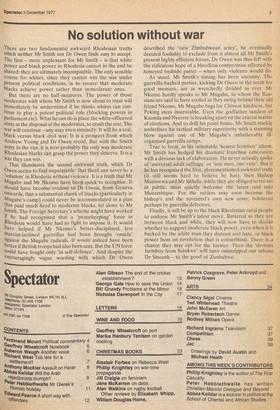No solution without war
There are two fundamental awkward Rhodesian truths Which neither Mr Smith nor Dr Owen finds easy to accept. The first — more unpleasant for Mr Smith — is that white Power and black power in Rhodesia cannot in the end be Shared: they are ultimately incompatible. The only sensible course for whites, since they cannot win the war under Present political conditions, is to ensure that moderate blacks achieve power rather than immoderate ones.
But there are no half-measures. The power of those moderates with whom Mr Smith is now about to treat will immediately be undermined if he thinks whites can continue to play a potent political role (blocking powers in Parliament etc). What he can do is place the white-officered army at the disposal of the moderates, to crush the rest. The War will continue — any may even intensify. It will be a real, black versus black civil war. It is a prospect from which Andrew Young and Dr Owen recoil. But with the Smith army in the van, it is now probably the only way moderate Rhodesian blacks can grasp the power they deserve. It is a war they can win.
That illuminates the second awkward truth, which Dr Owen seems to find unpalatable: that there can never be a 'solution' in Rhodesia without violence. It is a truth that Mr Mugabe and Mr Nkomo have been quick to recognise. It Should have become evident to Dr Owen, from Geneva onwards, that a substantial chunk of blacks (particularly in Mugabe's camp) could never be accommodated in a plan that paid much heed to moderate blacks, let alone to Mr Smith, The Foreign Secretary's scheme might have worked if he had recognised that a 'peacekeeping' force in Rhodesia would have had to fight to impose it. It would have helped if Mr Nkotno's better-disciplined, less Marxist-inclined guerrillas had been brought 'onside' against the Mugabe radicals. It would indeed have been better if British troops had also been sent. But the UN force Could have fought only 'in self-defence'. And despite the encouragingly vague wording with which Dr Owen described the 'new Zimbabwean army', • he eventually decided foolishly to exclude from it almost all Mr Smith's present highly efficient forces. Dr Owen was thus left with . the ridiculous hope of a bloodless compromise effected,by honeyed bedside patter — when only violence would do.
As usual, Mr Smith's timing has been uncanny. The guerrilla-backed parties, kicking Dr Owen in the teeth for good measure, are as wretchedly divided as ever. Mr Nkomo hardly speaks to Mr .Mugabe, to whom the Russians are said to have cooled as they swing behind their old friend Nkomo. Mr Mugabe begs for Chinese kindness, but Peking stays inscrutable. Even the godfather tandem of Kaunda and Nyerere is breaking apart on the crucial matter of elections. And to drill his point home, Mr Smith starkly underlines his tactical military superiority with a stunning blow against one of Mr Mugabe's unbelievably illorganised guerrilla camps.
True to form, in his inimitable 'honest farmboy'. idiom, Mr Smith has hedged his dramatic franchise concession with a devious lack of elaboration. He neyer actually spoke of 'universal adult suffrage' or 'one man, one vote'. But if he has recognised the first, aforementioned awkward truth (it still seems hard to believe he has), then Bishop Muzorewa and Mr Sithole, while they are obliged to tut-tut in public, must quietly welcome the latest raid into Mozambique. For the raiders may soon become the bishop's and the reverend's own new army, bolstered perhaps by guerrilla defectors.
Finally, it will he up to the black Rhodesian rural people to endorse Mr Smith's latest move. Battered as they are between black and white, they will now have to decide whether to support moderate black power, even when it is backed by the white man they distrust and hate, or black power bent on revolution that is colourblind. There is a chance they may opt for the former. Then the 'devious farmboy from Selukwe' will have outstripped our urbane Dr Smooth — to the 'good of Zimbabwe.










































 Previous page
Previous page